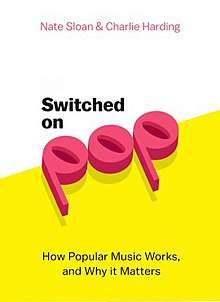Switched on Pop
Switched on Pop: How Popular Music Works, and Why it Matters is a 2019 nonfiction book written by Charlie Harding and Nate Sloan with illustrations provided by Iris Gottlieb.[1][2] The book covers pop music from a musicological perspective. The book gets its title from the podcast Switched on Pop which is co-hosted by Harding and Sloan and similarly analyzes pop music in a more academic style.[2]
 | |
| Author |
|
|---|---|
| Subject | Pop music |
| Publisher | Oxford University Press |
| Pages | 224 |
| ISBN | 978-0-190-05665-0 |
| LC Class | ML3470 .S6 2020 |
Background
Nate Sloan is a musicology professor at the Thornton School of Music of the University of Southern California.[1] Charlie Harding is a songwriter and a music producer.[3] Harding and Sloan started their podcast in October 2014.[4] In the podcast, which is released by Vox Media, the duo discuss and analyze the musical concepts behind popular music.[5][3]
Overview
The book contains 16 chapters. Each chapter in the book focuses on a pop song from the previous twenty years and uses it to explain a specific musical concept.[1] "Hey Ya!" by Outkast, "You Belong with Me" by Taylor Swift, "We Are Young" by Fun, "We Found Love" by Rihanna, "Chandelier" by Sia, "What Goes Around... Comes Around" by Justin Timberlake, "Break Free" by Ariana Grande, "God's Plan" by Drake, "Swimming Pools (Drank)" by Kendrick Lamar, "Love On Top" by Beyoncé, "Oops!... I Did It Again" by Britney Spears, "Paper Planes" by M.I.A., "Scary Monsters and Nice Sprites" by Skrillex, "Despacito" by Luis Fonsi, "Since U Been Gone" by Kelly Clarkson, and "Made in America" by Jay-Z and Kanye West are used to explain meter, melody, harmony, form, timbre, lyric, hook, rhyme, syncopation, modulation, counterpoint, sampling, sound design, tonal ambiguity, genre, and musical identity, respectively.[6] "Call Me Maybe" by Carly Rae Jepsen and "Get Enough" by Paul McCartney are also analyzed.
References
- McKenna, Max (January 16, 2020). "'Switched on Pop' Schools the Academy". PopMatters. Retrieved August 14, 2020.
- Amar, John (May 15, 2020). "Beethoven to Beyoncé: Switched on Pop Authors and Podcast Hosts Reveal the Powers of Popular Music". Houston Press. Retrieved August 14, 2020.
- Johnson, Ellen (December 9, 2019). "Switched On Pop Hosts Charlie Harding & Nate Sloan Tell You Why You Should Care About Pop Music in New Book". Paste. Retrieved August 14, 2020.
- Wafai, Yasmeen (January 16, 2020). "Why do the catchy lyrics always get stuck in your head? This book about pop music explains". The Seattle Times. Retrieved August 14, 2020.
- Hancock, Amanda (September 29, 2019). "Why Lewis Capaldi's sad banger 'Someone You Loved' has become an unlikely pop hit". Colorado Springs Gazette. Retrieved August 14, 2020.
- Sloan, Nate; Harding, Charlie. Switched on Pop : How Popular Music Works, and Why it Matters. New York, NY: Oxford University Press. pp. vii–viii. ISBN 978-0-190-05665-0.